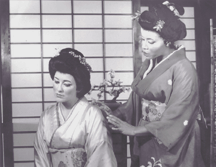

[ Metro | Metroactive Central | Archives ]
Madama in Flight
 Scott Hinrichs Scant Comfort: Suzuki (Jeanette Blakeney) attempts to assuage the lover's pain of Cio-Cio-San (Cynthia Clayton) in "Madama Butterfly." Opera San José launches a touching version of 'Butterfly' By Philip Collins Puccini's lyric heartbreaker Madama Butterfly spread its wings and took flight at San Jose's Montgomery Theater Saturday night. Opera San José offers an emotionally stirring case for the opera with lovely singing and robust--though at times indelicate--orchestral rapport. As both stage director and set designer, Daniel Helfgot awakens Madama Butterfly's turn-of-the-century exoticism with succinctly styled movement and sets tailored handsomely to the theater's cozy dimensions. Cynthia Clayton's performance as Cio-Cio was, understandably, central to the production's success. This opera can't get off the ground without a Butterfly who sings beautifully and lends credible dramatic presence. Clayton's portrayal satisfied both requirements, stoking the opera's emotional core while handling sweetly its relentless vocal demands. Emotional focus and tone quality were unflagging. Even in the highest of terrains, Clayton's voice was supported and full--comely despite blemishes of strain in the second act. Clayton's deep investment into her character's emotional center helped fuse together the opera's choppy sequential form. Cio-Cio's role is so central, in fact, that all others--including Pinkerton, Suzuki and Sharpless--hardly rise above supporting stature. As sole beneficiary to the story's tragic course, Butterfly is the only character that seems subject to the whims of fate; the rest are either perpetrators or spectators. It is a thoroughly sad tale but poignant on operatic terms. Everyone knows from the get-go that innocence is doomed to take the big fall, but Puccini's ravishing music makes the ride so delicious. One can't help but appreciate the absence of easy and gratuitous pathos--hardly typical among composers of his day. The score to Madama Butterfly maintains a poised vantage throughout, a ceremoniousness that evokes atmospheres more akin to Japan's strictly observed formalities than those experienced in America or Europe. It is this quality of emotional distancing that makes Madama Butterfly unique in the literature, revealing the composer's empathy for Asian culture, more so than the score's superficial forays into Orientalism might suggest. Puccini sensed mighty potential for musical drama when he attended a performance of David Belasco's play Madame Butterfly in London in 1900. The story of a 15-year-old Japanese girl who is married, impregnated and deserted by an uncaring American naval lieutenant--only to be visited by him and his new Caucasian wife three years later during their attempt to gain custody of her child--is powerful on its own terms. The officer's callous behavior, however, takes on especially despicable proportions when considered metaphorically as a personification of Western imperialism. Talk about irony; it's a constant, particularly audible in the juxtapositions of Puccini's elegant music and the condescending treatment Pinkerton showers on his Japanese hosts. As Pinkerton, tenor John Bellemer offered panache, alluring tone and marginal passion--the near-perfect cad. In his pivotal duets with Cio-Cio, "Viene la sera" and "Vogliatemi bene," concluding Act I, Bellemer was politely seductive. As if intent upon emphasizing Pinkerton's shallow affections toward Cio-Cio, Bellemer's enticements came off more calculated than enraptured. In Act III, "Addio fiorito asil," Pinkerton's lament to Butterfly, Bellemer stopped short of mining the song's depths. But the big question is: Why not a haircut? Bellemer's shoulder-length curls capsize any attempt at seriousness. Baritone Mel Ulrich rendered the role of Sharpless, the U.S. Consul, superbly. Sharpless has the thankless task of trying to steer the letching lieutenant along a virtuous path, and as such, he is the only Caucasian with a shred of integrity or charm in the opera. Ulrich's even, mannered performance brought out his character's reverence for Japanese custom, and his singing is delectable, attuned to the brightest countenances of his vocal register. Suzuki, Madama Butterfly's servant and confidante, was brought to life compellingly by Jeanette Blakeney. Suzuki's vocal plaints mirror and expand upon her mistress' pathos, and Blakeney's expressive outpourings in the mezzo range displayed great urgency, despite some occasional difficulties negotiating between tessituras. Conductor David Rohrbaugh led a spirited performance that captured many of the score's attractions. Making due with the Montgomery's cramped pit area, the orchestra held strong, accommodating the opera's supple dynamicism with a string complement half the size normally encountered for this repertoire. Attempts to fill out Puccini's lush textural waves were not always successful, nor were all the particulars of the ensemble yet ironed out; nevertheless, orchestral support was never lacking. Madama Butterfly ultimately drives home the fact that life isn't fair, but it also offers the consoling reminder that we have beautiful music to help us get through it.
Madama Butterfly plays April 25-27, 30 and May 2-4 at 8pm and April 28 and May 5 at 3pm at the Montgomery Theater, Market and San Carlos streets, San Jose. Tickets are $32-$42. (408/437-4450) [ Metro | Metroactive Central | Archives ] | ||||||||||||||||||||||||||||||
This page was designed and created by the Boulevards team.
Copyright © 1996 Metro Publishing and Virtual Valley, Inc.